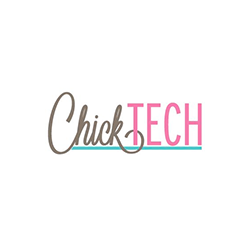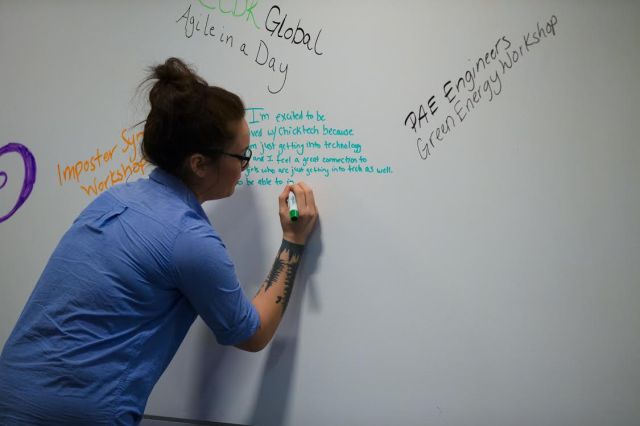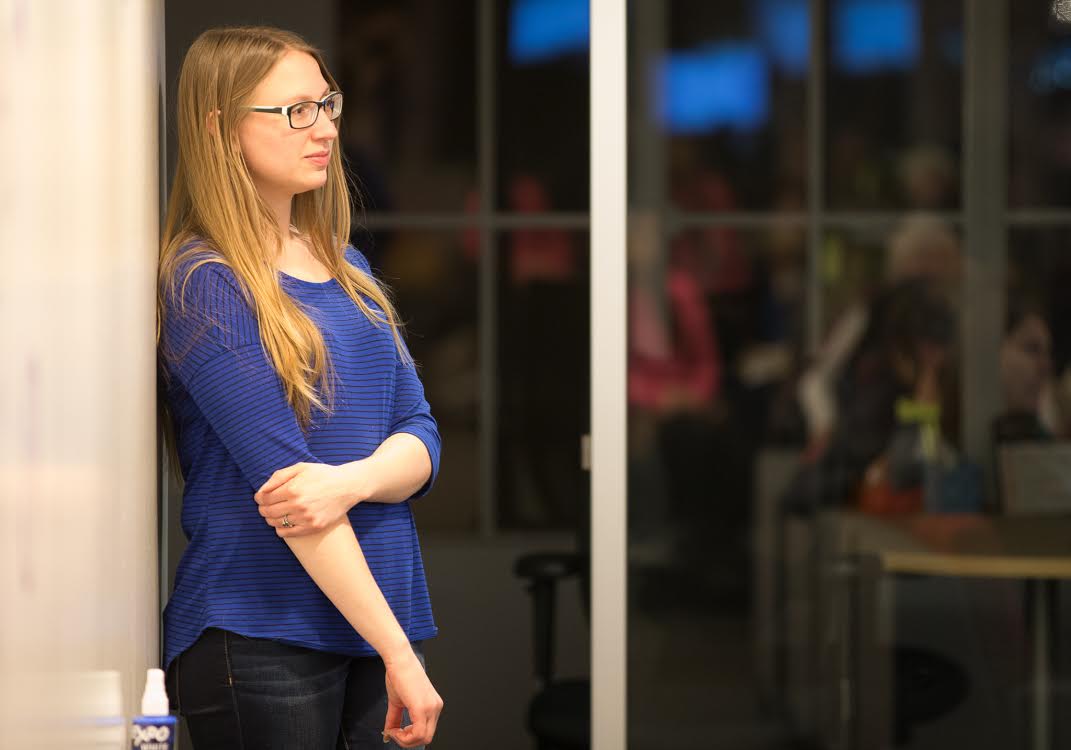I recently had the chance to sit down with Janice Levenhagen-Seeley, the founder of ChickTech, a national nonprofit whose headquarters are in Portland, Oregon. ChickTech is dedicated to retaining women in the technology workforce and increasing the number of women and girls pursuing technology-based careers. They are currently running an Indiegogo campaign to raise the funds to expand into more cities and we spoke to Levenhagen-Seeley about it all.
The Mary Sue: What does ChickTech do?
Janice Levenhagen-Seeley: We create a community that supports, empowers, and provides educational opportunities for girls and women. This year, we are expanding from 3 to 8 chapters throughout the country.
Although we run programs for girls and women of many ages and experience levels, our signature program is “ChickTech: High School.” This is a yearlong series of opportunities for 100 high school girls who have not yet opted into technology but who have the aptitude to do well in it. It includes project-based tech workshops that expand their ideas of what a tech career might look like, one-on-one mentoring with a professional in the technology industry, and internship opportunities in the summer.
TMS: Why is it important that girls get interested in STEM careers?
JLS: “Chick Tech: High School” is important because we need more girls choosing technology as a career. This is important for multiple reasons, but the two biggest ones are:
- As we say in our Indiegogo campaign, without diversity, technology will never reach its full potential. How can we create the best solution with only a small, homogenous portion of our population involved? So many studies have shown us the benefit of having a diverse team. Let’s start acting like engineers and use this scientific data to make systematic improvements for better outcomes.
- Women and girls deserve an equal say in our future, and at this point, that future is dominated by technology. I can’t imagine that changing anytime soon. It is unacceptable for women’s voices to be talked over, their opinions to be ignored, and their ideas to be automatically dismissed. What kind of civilization do we live in? One where all people are treated as equally valuable regardless of race, gender, and sexual orientation? Or the one that I see reflected in the reports of too many technology companies with no women on their executive teams or boards and only 2-15% women on their technology staff?
 TMS: What inspired you to start ChickTech?
TMS: What inspired you to start ChickTech?
JLS: I started ChickTech to give girls and women the support and sense of belonging that I didn’t have when I was a computer engineer. We focus on high school girls because so many of them are still not encouraged to be engineers and programmers, and they rarely even know what a career in tech would look like. Although I fell into technology, that just doesn’t happen to the vast majority. With ChickTech, we can change both the culture of the tech industry and help provide support until the culture values all people equally.
TMS: Why should someone contribute to your Indiegogo campaign?
JLS: The Indiegogo campaign is our first fundraising drive to both raise awareness and funds for our national expansion. ChickTech is a grassroots organization, and like any grassroots movement, we need the support of the people to create lasting cultural change.
TMS: What is the one thing that drives you to keep expanding ChickTech, not only in Portland but in other cities?
JLS: The one thing that drives me to continue expanding ChickTech is being reminded daily of the systemic inequalities that women and girls face, and the fact that so many of them will never reach their potential because of it.
TMS: Do you think ChickTech will ever expand to other countries?
JLS: Once we’re strong and sustainable in the US, we absolutely expect to expand to other countries.
TMS: How do you address concerns about sexism in tech careers with the participants? Has this come up in questions or do you address it head on before being asked?
 JLS: Many of our high school participants have already seen issues regarding sexism if they’ve tried other tech opportunities. Often, they think it’s just them. Without an organization like ChickTech, they don’t have a framework for understanding that this is a societal issue, or that it isn’t that they aren’t good enough–it’s that the current culture has a stereotype for who is good in technology and who doesn’t belong…and unfortunately, women tend to fit into the latter category. By giving them the emotional support they need, they can start to believe that “it’s okay to stand up against the sexism in [their] engineering class,” as one participant said.
JLS: Many of our high school participants have already seen issues regarding sexism if they’ve tried other tech opportunities. Often, they think it’s just them. Without an organization like ChickTech, they don’t have a framework for understanding that this is a societal issue, or that it isn’t that they aren’t good enough–it’s that the current culture has a stereotype for who is good in technology and who doesn’t belong…and unfortunately, women tend to fit into the latter category. By giving them the emotional support they need, they can start to believe that “it’s okay to stand up against the sexism in [their] engineering class,” as one participant said.
TMS: Why “Chick”Tech?
JLS: “Chick” has been reclaimed by this generation as a fun and empowering label…think “punk rock chick” or “rocker chick.” If you do a general Google search, you see women using the word positively to identify themselves: eco-chick, nomadic chick, “that computer chick.”
When we chose the name, we had never heard of it being used negatively. It was chosen because it was more fun than “women”, definitely more fun than “females”; and “girls” didn’t feel right for a group for both women and girls. So far, our hundreds of high school participants seem to embrace and identify with it! It is our goal that we continue to take it back by empowering and supporting powerful, confident, and creative women through our organization.
TMS: Why pink?
JLS: We have chosen to break the stereotype that says that women can’t be feminine and technical, or pretty and smart. A group of technical women chose because that is what they enjoyed and what made them happy. Who are we, who is anyone, to tell them that they aren’t allowed to like pink; that they should choose a more masculine color; that being feminine and liking pretty things is to be frowned upon, especially as intelligent engineers?
Marissa Nolan-Layman is a freelance social media specialist and is Editor in Chief of Nerds in Babeland. You can find her on Twitter, @MissMarissaMae.
Are you following The Mary Sue on Twitter, Facebook, Tumblr, Pinterest, & Google +?









Published: Mar 9, 2015 12:57 pm